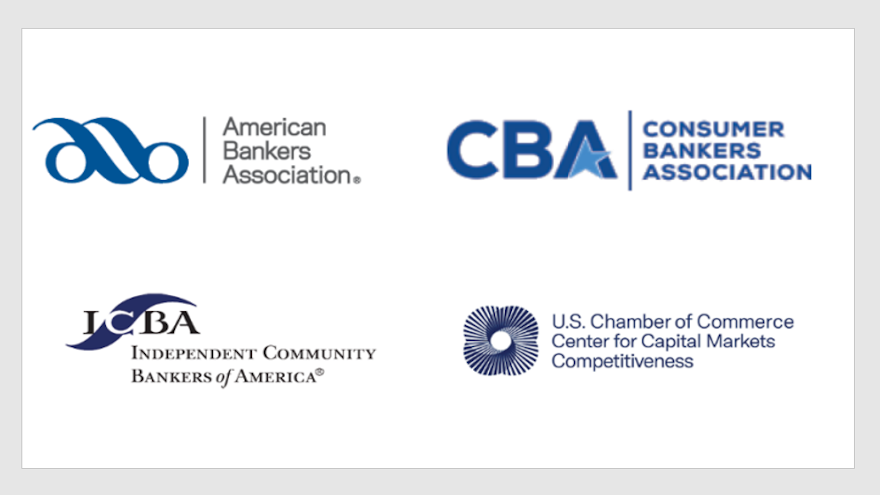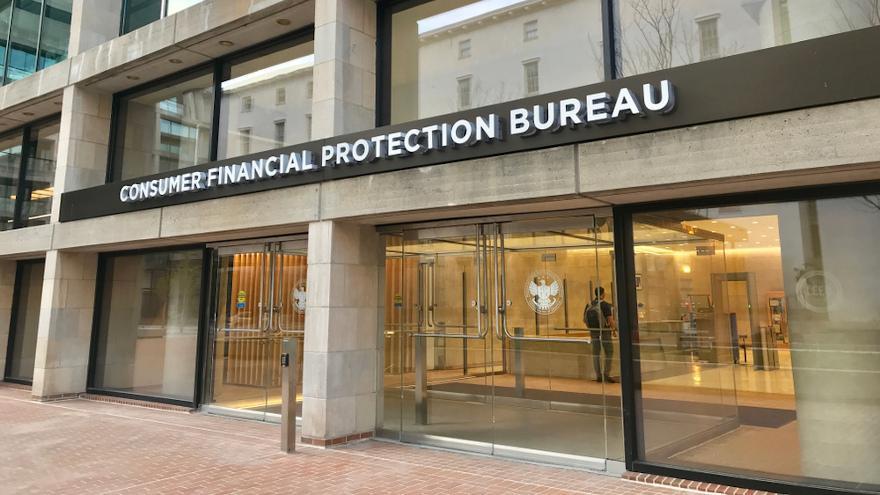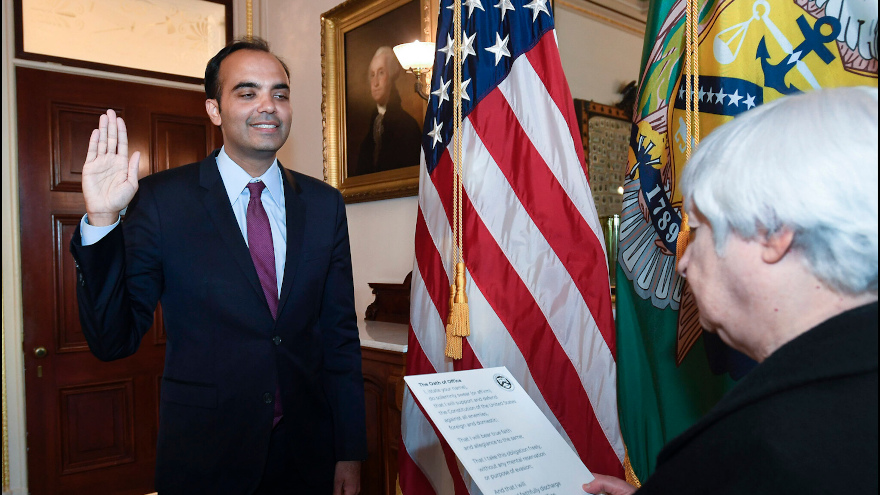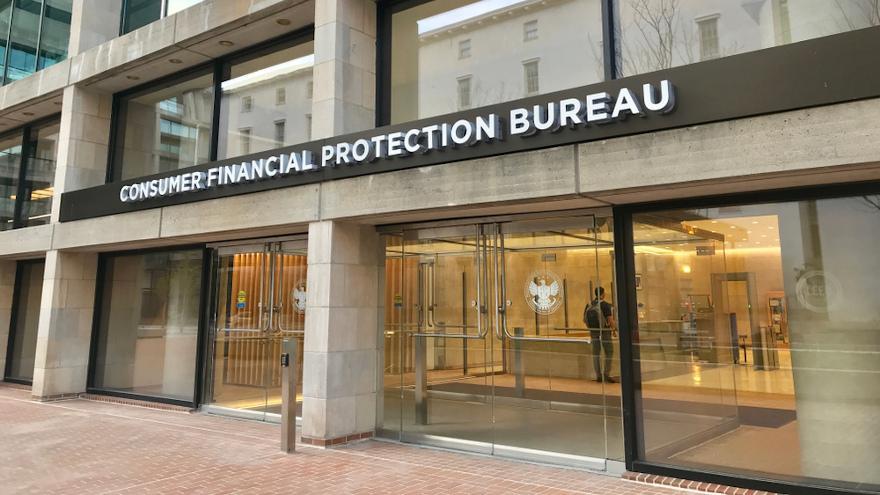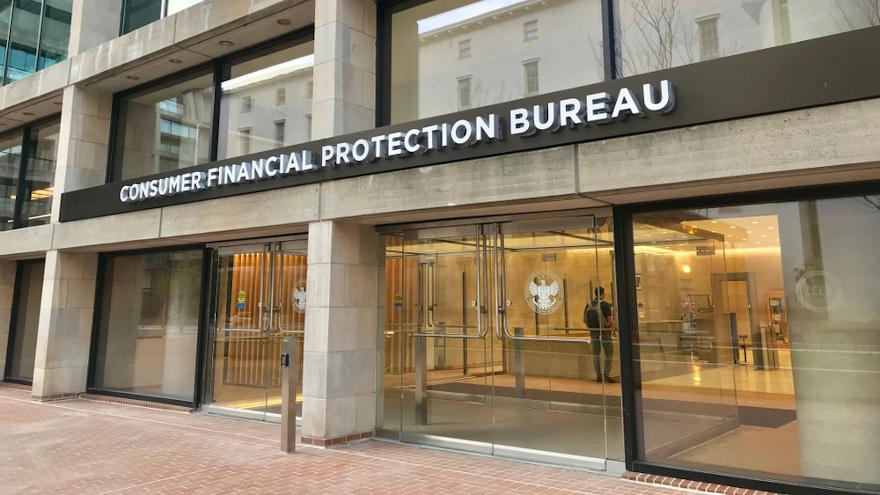The American Bankers Association, the Consumer Bankers Association, the Independent Community Bankers Association and the U.S. Chamber of Commerce collaborated to compile a 21-page white paper and sent it to the Consumer Financial Protection Bureau (CFPB).
The paper made the group’s argument to the bureau to rescind recent changes made to the Unfair, Deceptive, or Abusive Acts or Practices (UDAAPs) examination manual, which they called, “an enormous self-expansion of the agency’s authority that stands contrary to law and the intent of Congress.”
In the joint white paper entitled, Unfairness and Discrimination: Examining the CFPB’s Conflation of Distinct Statutory Concepts, the groups stated that the bureau’s recent expansion of fair lending laws may impede banks’ ability to deliver valued products and services for the millions of Americans they serve.
“Banks support fair, objective, and transparent enforcement of civil rights and fair lending laws. However, the CFPB’s action has created significant uncertainty in the financial marketplace to the detriment of consumers and banks alike, and it raises profound substantive and procedural legal concerns,” they wrote.
As the groups went on to say, revisions to the UDAAP exam manual were clearly taken without legislative authority, may be subject to legal challenges and must be immediately rescinded:
“Congress did not authorize or intend for the CFPB to ‘fill gaps’ between the clearly articulated boundaries of antidiscrimination statutes with its UDAAP authority. Such sweeping changes that alter the legal duties of so many are the proper province of Congress, not of independent regulatory agencies,” they wrote.
To read the full white paper, go to this website.
American Financial Services Association senior vice president Celia Winslow recounted during a recent episode of the Auto Remarketing Podcast that AFSA has been seeking clarity about what the Consumer Financial Protection Bureau (CFPB) defines as risk for more than 10 years.
Just after Memorial Day, Winslow tried again, sending a letter to CFPB director Rohit Chopra again asking for the regulator’s risk definition in light of bureau’s proposed rule on supervisory authority over certain nonbank covered persons based on risk determination.
“AFSA fervently opposes the bureau’s proposal to publicize its designation of a covered person as a — yet undefined — ‘risky business.’ Before using this authority, and in the interest of transparency, AFSA urges the bureau to define ‘risk to consumers,’” Winslow began the letter.
Winslow explained that AFSA strongly discourages the bureau from publicizing any designation of covered persons under this rule. She also pointed out that AFSA actually agrees with the CFPB’s stance that “a central principle of the supervisory process is confidentiality.”
Winslow then wrote, “There is a vast and insurmountable difference between the public knowing that all banks over $10 billion, along with companies designated as ‘larger participants’ by the CFPB in a rulemaking, and the bureau deeming a specific business risky — again, under yet undefined criteria — and announcing that it will be supervised by the bureau.
“AFSA finds the logic behind this change flawed,” Winslow continued. “While the bureau states it proposes this change to ‘level the playing field,’ this rule does not create parity, but rather exposes companies to a potentially public, reputation-damaging designation of ‘risky’ with little opportunity to challenge it due to a lack of an administrative appeals process. The mere adverse publicity associated with a bureau declaration that a business is risky would impose unfair adverse reputational consequences upon the business. The public disclosure of the designation creates both an unnecessary confirmation bias and an unfair distrust of certain companies.
“Moreover, when the bureau makes a public declaration of supervision of a particular business model or product, this action alone sends a message to the market (to competitors, investors, and customers) that something is wrong at that institution,” Winslow went on to say. “And, under existing exam confidentiality rules, the supervised nonbank cannot make any public remarks about the nature of the supervision to address the bureau’s public disclosure. Further, if the nonbank were allowed to defend itself in the court of public opinion, the exam will be adversarial. As a result, the nonbank will be harmed by the declaration without any way to put the declaration of supervision in proper context.”
Winslow closed her letter by referencing Chopra’s comments to Congress.
“Additionally, a clear definition of the ‘risks to consumers’ will aid in the bureau’s mission to enhance transparency,” she said. “In the director’s testimony before the Senate Banking Committee last month, the director stated: ‘Laws work best when they are easy to understand, easy to follow, and easy to enforce.’ This statement is undeniably true; however, the lack of definitions in the rule makes it difficult to understand, to follow, and to enforce in a fair and appropriate manner.
“AFSA requests the bureau to incorporate clear definitions in the Rule as a part of its mission and commitment to transparency,” she added.
American Financial Services Association senior vice president Celia Winslow made another visit for the Auto Remarketing Podcast. This time, the former Women in Auto Finance honoree explained what “dormant authority” is now being leveraged by the Consumer Financial Protection Bureau.
Winslow also gave an update on other federal regulatory developments potentially connected to auto financing.
To listen to the conversation, click on the link available below, or visit the Auto Remarketing Podcast page.
Download and subscribe to the Auto Remarketing Podcast on iTunes or on Google Play.
Along with detailing another procedural rule, the Consumer Financial Protection Bureau (CFPB) found another potential way to examine your operations and potentially take actions against your company.
This week, the CFPB announced that it is invoking a largely unused legal provision to examine nonbank financial companies that the bureau believes can pose risks to consumers.
The CFPB said in a news release that utilizing this “dormant authority” will help protect consumers and “level the playing field” between banks and nonbanks.
Officials explained such risky conduct may involve, for example, potentially unfair, deceptive, or abusive acts or practices, or other acts or practices that potentially violate federal consumer financial law. The bureau may base such reasonable cause determinations on complaints collected by the CFPB, or on information from other sources, such as judicial opinions and administrative decisions.
The CFPB said it may also learn of such risks through whistleblower complaints, state partners, federal partners, or news reports.
The agency added that it is also seeking public comments on a procedural rule to make this process more transparent.
“Given the rapid growth of consumer offerings by nonbanks, the CFPB is now utilizing a dormant authority to hold nonbanks to the same standards that banks are held to,” CFPB director Rohit Chopra said in the news release. “This authority gives us critical agility to move as quickly as the market, allowing us to conduct examinations of financial companies posing risks to consumers and stop harm before it spreads.”
Under the Dodd-Frank Wall Street Reform and Consumer Protection Act of 2010, the CFPB reiterated that it has authority to use traditional law enforcement to stop companies from engaging in conduct that pose risk to consumers. The bureau acknowledged this power can involve adversarial litigation.
“However, the law also gives the CFPB authority to conduct supervisory examinations to review the books and records of regulated entities,” the bureau said in the news release. “CFPB examiners typically provide a report to entities with problems that need to be addressed, and responsible institutions typically take prompt corrective action.”
For decades before the Dodd-Frank Act, the CFPB pointed out that only banks and credit unions were subject to federal supervision.
“But after the 2008 financial crisis in which nonbank companies played a pivotal role, Congress tasked the CFPB with supervising certain nonbanks, in addition to large depository institutions with more than $10 billion in assets and their service providers,” officials said, asserting that many firms they now can supervise operate nationally and brand themselves as “fintechs.”
The regulator went on to mention that entities subject to the CFPB nonbank supervision can include nonbanks whose activities the CFPB has “reasonable cause” to determine pose risks to consumers.
“This authority is not specific to any particular consumer financial product or service,” officials said. “While the CFPB did implement the provision through a procedural rule in 2013, the agency has now begun to invoke this authority. This will allow the CFPB to be agile and supervise entities that may be fast-growing or are in markets outside the existing nonbank supervision program.”
Another CFPB rule update
The CFPB also issued a procedural rule this week to increase the transparency of the risk-determination process.
Unlike other provisions of law regarding nonbank supervision, the bureau explained in the same release that entities subject to supervision based on risk are given notice and an opportunity to respond.
In order to provide greater guidance to the marketplace on how the CFPB will make determinations, the CFPB is updating an aspect of its procedures for risk determinations to authorize the release of certain information about any final determinations made,” officials said about the procedural rule that can be viewed online.
“The company involved will have an opportunity to provide input to the CFPB on what information is released to the public,” officials added.
Both the Consumer Financial Protection Bureau and TransUnion used strong language in statements last week, as the regulator filed a lawsuit against the credit bureau, two of its subsidiaries, and an executive that the company said is no longer with the firm.
Because the bureau said the lawsuit stems from a 2017 law enforcement order CFPB director Rohit Chopra called TransUnion “an out-of-control repeat offender that believes it is above the law.”
The credit bureau responded by saying, “The claims made by the CFPB against TransUnion and John Danaher, a former executive, are meritless and in no way reflect the consumer-first approach we take to managing all our businesses.”
The CFPB recapped that its order with TransUnion was issued to stop the company from engaging in “deceptive” marketing, regarding its credit scores and other credit-related products.
“After the order went into effect, TransUnion continued its unlawful behavior, disregarded the order’s requirements, and continued employing deceitful digital dark patterns to profit from customers,” the bureau said in a news release, noting that its complaint also alleges that TransUnion violated additional consumer financial protection laws.
“I am concerned that TransUnion’s leadership is either unwilling or incapable of operating its businesses lawfully,” Chopra added in the news release.
The rest of TransUnion’s response also made assertions about how the CFPB operated ahead of the lawsuit filing. TransUnion went on to say:
In January 2017, TransUnion entered into a consent order with the CFPB relating to how it markets TransUnion Credit Monitoring, a subscription product that offers consumers credit monitoring and identity theft protection services, as well as access to their credit scores. Shortly thereafter, as required by the consent order, TransUnion submitted to the CFPB for approval a plan detailing how it would comply with the order. The CFPB ignored the compliance plan, despite being obligated to respond and trigger deadlines for implementation. In the absence of any sort of guidance from the CFPB, TransUnion took affirmative actions to implement the consent order.
We have been in compliance with our obligations and we remain in compliance with the consent order today. Rather than providing any supervisory guidance on this matter and advising TransUnion of its concerns — like a responsible regulator would — the CFPB stayed silent and saved their claims for inclusion in a lawsuit, including naming a former executive in the complaint. Despite TransUnion’s months-long, good faith efforts to resolve this matter, CFPB’s current leadership refused to meet with us and were determined to litigate and seek headlines through press releases and tweets. The CFPB’s unrealistic and unworkable demands have left us with no alternative but to defend ourselves fully.
Over the last several years, and under the direction of new leadership, TransUnion has led the credit reporting industry in making significant changes aimed at benefitting consumers and increasing transparency in the credit reporting process.
In its press release, the CFPB explained what dark patterns are, calling them “hidden tricks or trapdoors” companies build into their websites to get consumers to inadvertently click links, sign up for subscriptions, or purchase products or services.
“Dark patterns can complicate or hide information, such as making it difficult for consumers to cancel a subscription service,” the CFPB said.
“As alleged in the complaint, TransUnion used an array of dark patterns to trick people into recurring payments and to make it difficult to cancel them. For example, under federal law, Americans are entitled to a free credit report from TransUnion through annualcreditreport.com,” the CFPB continued. “TransUnion asked consumers to provide credit card information that appeared to be part of an identity verification process. TransUnion then integrated deceptive buttons into the online interface that gave the impression that the consumer could also access a free credit score in addition to viewing their free credit report.
“In reality, clicking this button signed consumers up for recurring monthly charges using the credit card information they had provided,” the CFPB added.
While the CFPB acknowledged in its press release that Danaher recently separated from TransUnion, the regulator explained why the executive’s alleged actions drew the agency’s attention.
“Among other things, Danaher determined that using an affirmative selection checkbox, required by the order to limit unintended subscription enrollments, would result in fewer enrollments into TransUnion’s Credit Monitoring service. Danaher instructed TransUnion Interactive to cease using the checkbox, which led to millions of enrollments,” the CFPB said.
The CFPB mentioned that it is seeking monetary relief for consumers, such as restitution or return of funds, disgorgement or compensation for unjust gains, injunctive relief and civil money penalties.
“The complaint is not a final finding or ruling that the defendants have violated the law,” officials said.
The entire CFPB lawsuit against TransUnion is available online as well as the regulator’s 2017 consent order with the credit bureau.
An individual’s assessment about your finance company’s service now is getting greater attention from the Consumer Financial Protection Bureau, too.
The bureau recently issued policy guidance regarding potentially illegal practices related to consumer reviews. The CFPB said that it seeks to ensure that customers can write reviews — particularly ones posted online — about financial products and services that accurately reflect their opinions and experiences.
Officials said the guidance also highlights that practices such as posting fake reviews or inserting clauses that forbid a customer from publishing an honest review may violate the Consumer Financial Protection Act.
CFPB director Rohit Chopra said banks and financial companies should ensure that their customer review practices comply with all applicable laws, including the Consumer Financial Protection Act.
Violations are subject to civil penalties and other legal consequences, according to the CFPB.
“In America, no corporation should be able to silence a customer from posting an honest review online,” Chopra said in a news release. “Corporate disinformation campaigns that suppress legitimate reviews or manufacture fake reviews are not only a threat to free speech and fair competition, they are also illegal.”
The CFPB’s guidance describes certain business practices related to customer reviews that are generally unlawful under the Consumer Financial Protection Act, including:
— Contractual ‘gag’ clauses: Attempting to silence consumers from posting an online review can undermine fair competition, according to the bureau. Officials explained banks and financial companies that include clauses in form contracts that forbid a consumer from posting an honest review may be engaged in unfair or deceptive practices.
— Fake reviews: The CFPB said markets can be harmed if consumers cannot trust that online reviews are legitimate. Officials noted that laundering fake reviews in ways that appear completely independent from the company to improve their ratings may constitute a deceptive practice.
— Review suppression or manipulation: The bureau said consumers cannot easily shop and compare products and services when firms engage in practices to limit the posting of negative reviews or manipulate reviews to trick or confuse consumers. Officials pointed out the guidance explains why these practices may be unlawful.
The CFPB went on to mention this effort is related to the Federal Trade Commission’s efforts to deter fake reviews and related fraud across the digital economy.
The FTC recently voted to put hundreds of businesses on notice about fake reviews and misleading endorsements, which may result in significant penalties against marketers that engage in this misconduct.
The CFPB bulletin associated with consumer reviews can be found via this website.
The Consumer Financial Protection Bureau database indicated that the agency received 527,243 consumer complaints during the 12-month span that closed on Feb. 28.
Of that amount, only 8,042 complaints — or 1.5% — fell into the categories that the CFPB classified as “vehicle loan or lease.” The majority of the consumer complaints (335,161) during those 12 months fell within “credit reporting, credit repair services or other personal consumer reports.”
The next highest category in the CFPB database for this timeframe was “debt collection” (70,696), following by “credit card or prepaid card” (32,614).
On Monday, CFPB director Rohit Chopra gave an online speech titled, “Reining in Repeat Offenders,” that was the 2022 Distinguished Lecture on Regulation for the University of Pennsylvania Law School.
Chopra received his master’s degree from this Ivy League school in Philadelphia and began his speech by saying, “Not only did I grow up nearby, I was also fortunate to attend business school here at Penn. Today, my classmates, students, and other alumni are now financiers, convicted felons and everything in between.
“While here — and I was hardly alone on this point — I viewed financial regulators as clueless and often corrupt lawyers and economists,” he continued. “Government officials were often seen as auditioning for a future job in finance to exploit their inside knowledge to help dominant financial firms evade accountability for wrongdoing and extract special favors, even when they violate the law repeatedly.”
Later in his speech, Chopra reiterated what the bureau is now trying to do, tying the objective back to the title of his remarks.
“Achieving general deterrence is an important goal for the CFPB. We need penalties where the expected financial benefits of an illegal scheme do not outweigh the expected costs. And we need an understanding that agency and court orders are not suggestions. Put plainly, regulators charged with overseeing large institutions have lost credibility when it comes to halting repeat offenders. While headline-driven penalties give the guise of deterrence, they do not work for dominant, powerful firms,” Chopra said.
“In the end, we need to look at bright-line structural remedies, rather than press-driven approaches. As any gardener knows, to address a weed, you need to get at the root, rather than constantly monitoring what is simply seen on the surface,” he went on to say.
Already with a heightened interest in vehicle repossessions, the Consumer Financial Protection Bureau (CFPB) announced changes last week to its supervisory operations involving what it deems to be illegal discrimination, including in situations where fair lending laws may not apply.
The bureau explained through a news release that during the course of examining banks’ and other companies’ compliance with consumer protection rules, the CFPB will scrutinize discriminatory conduct that violates the federal prohibition against unfair practices.
The CFPB said it will closely examine financial institutions’ decision-making in advertising, pricing, and other areas to ensure that companies are appropriately testing for and eliminating illegal discrimination.
The CFPB reiterated that it enforces several laws that can target discriminatory practices. Government regulators and private plaintiffs have commonly relied on the Equal Credit Opportunity Act (ECOA), a fair lending law which covers extensions of credit.
However, the bureau said certain discriminatory practices may also trigger liability under the Consumer Financial Protection Act (CFPA), which prohibits unfair, deceptive and abusive acts and practices (UDAAPs).
The CFPB published an updated exam manual for evaluating UDAAPs, which notes that discrimination may meet the criteria for “unfairness” by causing substantial harm to consumers that they cannot reasonably avoid, where that harm is not outweighed by countervailing benefits to consumers or competition.
“Consumers can be harmed by discrimination regardless of whether it is intentional. Discrimination can be unfair in cases where the conduct may also be covered by ECOA, as well as in instances where ECOA does not apply,” the CFPB said in its news release. “For example, denying access to a checking account because the individual is of a particular race could be an unfair practice even in those instances where ECOA may not apply.
The CFPB said it will examine for discrimination in all consumer finance markets, including credit, servicing, collections, consumer reporting, payments, remittances, and deposits.
CFPB examiners will require supervised companies to show their processes for assessing risks and discriminatory outcomes, including documentation of customer demographics and the impact of products and fees on different demographic groups.
The CFPB also mentioned that it will look at how companies test and monitor their decision-making processes for unfair discrimination, as well as discrimination under ECOA.
“When a person is denied access to a bank account because of their religion or race, this is unambiguously unfair,” CFPB director Rohit Chopra said in the news release. “We will be expanding our anti-discrimination efforts to combat discriminatory practices across the board in consumer finance.”
The updated exam manual on unfair, deceptive or abusive acts or practices can be found via this website.
The Consumer Financial Protection Bureau used strong language in a news release Monday upon issuing a compliance bulletin on vehicle repossessions.
The CFPB said it is “moving to thwart illegal repossessions in the heated auto market.” The bureau said it was also prompted to compile the 13-page bulletin because of “conduct observed during CFPB examinations and enforcement actions, including the illegal seizure of cars, sloppy record keeping, unreliable balance statements, and ransom for personal property.”
The bureau used the bulletin to reiterate its enforcement power regarding prohibition on finance companies, forwarders and repossession agents engaging in unfair, deceptive, or abusive acts or practices (collectively UDAAPs) when repossessing vehicles.
The CFPB emphasized that it plans to hold these entities accountable if they commit UDAAPs when repossessing vehicles, including:
• Repossessed vehicles if consumers’ loan account is current, even if there was a prior delinquency.
• Repossessed vehicles if consumers entered an agreement to extend the loan.
• Repossessed vehicles if consumers followed any instructions the company said would result in avoiding repossession.
• Repossessed vehicles from consumers who have filed for bankruptcy, and thus are protected by an automatic stay of collection activity.
• Repossessed vehicles as a result of processing payments in a different order than had been communicated to consumers.
• Repossessed vehicles after unlawful fees pushed the consumer’s account into default.
• Withhold personal property found in repossessed vehicles until consumers pay an upfront fee to recover the property.
• Charged for collateral protection insurance after a vehicle is repossessed.
To prevent these unfair, deceptive, or abusive acts or practices, the CFPB said in the bulletin that entities should consider doing the following:
• Review policies and procedures, including call scripts, to ensure that they provide employees with accurate information about steps consumers can take to prevent repossession.
• Review policies and procedures regarding cancellation of repossession orders to ensure that there is an appropriate process for cancelling repossessions if consumers take steps that should result in cancellation.
• Ensure prompt communications between the servicer and repossession service provider when the servicer cancels a repossession. For example, servicers may call repossession service providers to confirm cancelation or use mobile phone applications that push cancellation updates to repossession service providers’ phones.
• Monitor repossession service providers for compliance with repossession cancellations.
• Incorporate monitoring of wrongful repossession in regular monitoring and audits of communications with consumers.
• Ensure that the entity has a corrective action program to address any violations identified and to reimburse consumers for the direct and indirect costs incurred as a result of unlawful repossessions when appropriate.
• Review payment allocation policies and procedures to validate that they are consistent with the payment allocation order disclosed in contracts and other consumer facing disclosures, such as websites.
• Monitor for illegal fees charged after repossession.
• Review consumer contracts to validate that any fees charged to consumers are authorized under the terms of applicable contracts.
• Review consumer complaints regarding repossession and ensure there is an appropriate channel for receiving, investigating, and properly resolving consumer complaints relating to wrongful repossession and illegal fees after repossession.
• Perform regular reviews of service providers, including repossession vendors, as to their pertinent practices.
• Monitor any force-placed insurance (FPI) program to ensure that consumers are not charged for unnecessary FPI. This may include review of FPI cancellation rates.
In the news release, the CFPB made the assertion that finance companies might leveraging high wholesale prices. Monthly readings from Black Book, Cox Automotive, J.D. Power Valuation Services and KAR Global all have been near or above record levels for several months, according to content generated by Cherokee Media Group.
“The CFPB is concerned that these market conditions might create incentives for risky auto repossession practices, since repossessed automobiles can command higher prices when resold,” the bureau said.
“The timing of auto repossessions often comes as a surprise to borrowers and can cause devastating injury by depriving borrowers of the use of their vehicles,” the bureau continued.
“In addition, many people experience emotional distress when a car is taken from them, lose personal property, miss work or lose their job, incur expenses for alternative transportation, pay repossession-related fees, experience negative credit reporting, and have to repair vehicles damaged during the repossession process,” the CFPB went on to say.
The CFPB pointed out that auto financing now is the third largest consumer credit market in the United States with more than $1.46 trillion in outstanding balances, double the amount from 10 years ago.
“With today’s high car prices, auto lenders and investors might be tempted to seize vehicles for resale in the hot used car market,” CFPB director Rohit Chopra said in the news release. “No American ever wants to wake up to see their car stolen. Auto loan servicers need to ensure that every repossession is lawful.”
The Consumer Financial Protection Bureau (CFPB) wants to make it easier for individuals to have a say in how credit bureaus, auto finance companies and other providers of financial services are regulated by the agency.
Last week, in an effort for what the CFPB described as an easier path for the public to engage meaningfully with the agency and request regulatory changes, the bureau said members of the public now can submit petitions for rulemaking directly to the CFPB.
The petitions will be posted on public dockets for review and comment, according to a CFPB news release.
“Americans should be able to easily exercise their Constitutional rights without hiring a high-priced lawyer or lobbyist,” CFPB Director Rohit Chopra said about the initiative that officially began on Wednesday. “Our new program will broaden access to the agency’s rulemaking process.”
The bureau reiterated that the U.S. Constitution guarantees the public’s right to petition the government. While members of the public have long had the ability to comment on rules and other initiatives, the CFPB said many individuals and small businesses believe that they must hire former government officials, lawyers, or lobbyists in order to be heard by an agency.
The bureau explained these reforms will make it easier for individuals to directly submit a petition for rulemaking to the CFPB.
Members of the public can request that the agency pursue a new rule, amend an existing one, or repeal a rule.
“Former government employees and other individuals who are paid to influence the agency’s rulemaking agenda behind the scenes will be asked to submit their petition for public inspection instead,” the CFPB said in the news release.
“The CFPB is committed to transparency and listening to the concerns, suggestions, and ideas of the public it serves. The public’s petitions will help the CFPB identify consumer protection issues worthy of reform, rulemaking, or in need of further clarification,” the bureau continued.
CFPB officials pointed out that this new process is in line with recommendations issued by the Administrative Conference of the United States for improving transparency and ensuring that the public has a meaningful opportunity to petition the government.
The bureau went on to mention that this announcement is part of a series of steps the CFPB is taking to ensure “high standards of transparency and ethics, particularly when it comes to addressing the corrosive effects of the ‘revolving door.’”
The CFPB recently announced new staff guidance to report former government employees that may be misusing information they obtained while working in the government.
The bureau added that consumer complaints about specific financial products or services should be submitted through the CFPB’s complaint website.

